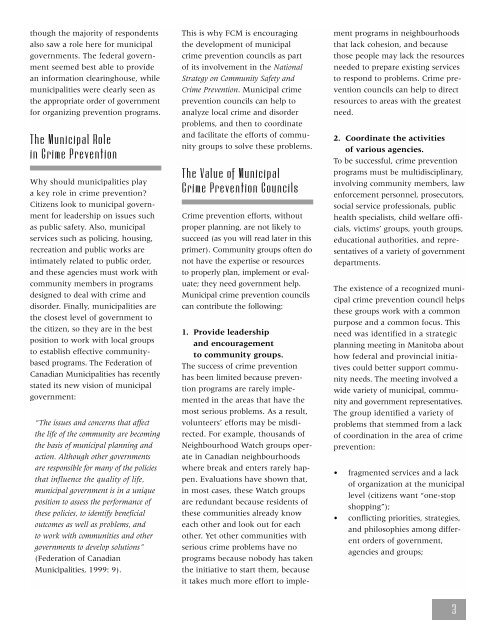Primer on Municipal Crime Prevention - FCM
Primer on Municipal Crime Prevention - FCM
Primer on Municipal Crime Prevention - FCM
You also want an ePaper? Increase the reach of your titles
YUMPU automatically turns print PDFs into web optimized ePapers that Google loves.
though the majority of resp<strong>on</strong>dents<br />
also saw a role here for municipal<br />
governments. The federal government<br />
seemed best able to provide<br />
an informati<strong>on</strong> clearinghouse, while<br />
municipalities were clearly seen as<br />
the appropriate order of government<br />
for organizing preventi<strong>on</strong> programs.<br />
The <strong>Municipal</strong> Role<br />
in <strong>Crime</strong> Preventi<strong>on</strong><br />
Why should municipalities play<br />
a key role in crime preventi<strong>on</strong>?<br />
Citizens look to municipal government<br />
for leadership <strong>on</strong> issues such<br />
as public safety. Also, municipal<br />
services such as policing, housing,<br />
recreati<strong>on</strong> and public works are<br />
intimately related to public order,<br />
and these agencies must work with<br />
community members in programs<br />
designed to deal with crime and<br />
disorder. Finally, municipalities are<br />
the closest level of government to<br />
the citizen, so they are in the best<br />
positi<strong>on</strong> to work with local groups<br />
to establish effective communitybased<br />
programs. The Federati<strong>on</strong> of<br />
Canadian <strong>Municipal</strong>ities has recently<br />
stated its new visi<strong>on</strong> of municipal<br />
government:<br />
“The issues and c<strong>on</strong>cerns that affect<br />
the life of the community are becoming<br />
the basis of municipal planning and<br />
acti<strong>on</strong>. Although other governments<br />
are resp<strong>on</strong>sible for many of the policies<br />
that influence the quality of life,<br />
municipal government is in a unique<br />
positi<strong>on</strong> to assess the performance of<br />
these policies, to identify beneficial<br />
outcomes as well as problems, and<br />
to work with communities and other<br />
governments to develop soluti<strong>on</strong>s”<br />
(Federati<strong>on</strong> of Canadian<br />
<strong>Municipal</strong>ities, 1999: 9).<br />
This is why <strong>FCM</strong> is encouraging<br />
the development of municipal<br />
crime preventi<strong>on</strong> councils as part<br />
of its involvement in the Nati<strong>on</strong>al<br />
Strategy <strong>on</strong> Community Safety and<br />
<strong>Crime</strong> Preventi<strong>on</strong>. <strong>Municipal</strong> crime<br />
preventi<strong>on</strong> councils can help to<br />
analyze local crime and disorder<br />
problems, and then to coordinate<br />
and facilitate the efforts of community<br />
groups to solve these problems.<br />
The Value of <strong>Municipal</strong><br />
<strong>Crime</strong> Preventi<strong>on</strong> Councils<br />
<strong>Crime</strong> preventi<strong>on</strong> efforts, without<br />
proper planning, are not likely to<br />
succeed (as you will read later in this<br />
primer). Community groups often do<br />
not have the expertise or resources<br />
to properly plan, implement or evaluate;<br />
they need government help.<br />
<strong>Municipal</strong> crime preventi<strong>on</strong> councils<br />
can c<strong>on</strong>tribute the following:<br />
1. Provide leadership<br />
and encouragement<br />
to community groups.<br />
The success of crime preventi<strong>on</strong><br />
has been limited because preventi<strong>on</strong><br />
programs are rarely implemented<br />
in the areas that have the<br />
most serious problems. As a result,<br />
volunteers’ efforts may be misdirected.<br />
For example, thousands of<br />
Neighbourhood Watch groups operate<br />
in Canadian neighbourhoods<br />
where break and enters rarely happen.<br />
Evaluati<strong>on</strong>s have shown that,<br />
in most cases, these Watch groups<br />
are redundant because residents of<br />
these communities already know<br />
each other and look out for each<br />
other. Yet other communities with<br />
serious crime problems have no<br />
programs because nobody has taken<br />
the initiative to start them, because<br />
it takes much more effort to imple-<br />
ment programs in neighbourhoods<br />
that lack cohesi<strong>on</strong>, and because<br />
those people may lack the resources<br />
needed to prepare existing services<br />
to resp<strong>on</strong>d to problems. <strong>Crime</strong> preventi<strong>on</strong><br />
councils can help to direct<br />
resources to areas with the greatest<br />
need.<br />
2. Coordinate the activities<br />
of various agencies.<br />
To be successful, crime preventi<strong>on</strong><br />
programs must be multidisciplinary,<br />
involving community members, law<br />
enforcement pers<strong>on</strong>nel, prosecutors,<br />
social service professi<strong>on</strong>als, public<br />
health specialists, child welfare officials,<br />
victims’ groups, youth groups,<br />
educati<strong>on</strong>al authorities, and representatives<br />
of a variety of government<br />
departments.<br />
The existence of a recognized municipal<br />
crime preventi<strong>on</strong> council helps<br />
these groups work with a comm<strong>on</strong><br />
purpose and a comm<strong>on</strong> focus. This<br />
need was identified in a strategic<br />
planning meeting in Manitoba about<br />
how federal and provincial initiatives<br />
could better support community<br />
needs. The meeting involved a<br />
wide variety of municipal, community<br />
and government representatives.<br />
The group identified a variety of<br />
problems that stemmed from a lack<br />
of coordinati<strong>on</strong> in the area of crime<br />
preventi<strong>on</strong>:<br />
• fragmented services and a lack<br />
of organizati<strong>on</strong> at the municipal<br />
level (citizens want “<strong>on</strong>e-stop<br />
shopping”);<br />
• c<strong>on</strong>flicting priorities, strategies,<br />
and philosophies am<strong>on</strong>g different<br />
orders of government,<br />
agencies and groups;<br />
3

















